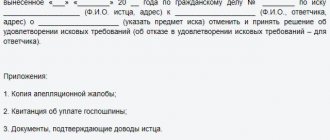When to complain about the inaction of a bailiff?
The task of the FSSP employees is to collect from the debtor the amounts due to the recipient. To do this, the bailiff must:
- Within 3 days from the date of receipt of the decision or court order on alimony, begin enforcement proceedings in the case.
- Notify the debtor of the opportunity to pay voluntarily within five days.
- If there is no response, apply coercive measures to the alimony provider: send a writ of execution to work, seize property, restrict travel outside Russia, etc.
The interested party has the right to control the progress of the work by familiarizing itself with the case materials. This right is enshrined in Art. 50 of the Law “On Enforcement Proceedings” No. 229-FZ. To obtain the necessary information, you need to come to the FSSP office in person or submit a written request.
If the study of the materials demonstrates that the bailiff did not take advantage of his legal powers and does not influence the alimony debtor, which is why the case does not move forward, the issue needs to be accelerated. The easiest way to defend your interests is to file a complaint with the management of the sluggish employee.
Other judicial nuances
When the enforcement proceedings are closed, and as a result a person or organization suffered from the inaction of the legal investigation during its implementation, the possibility of going to court remains.
The expiration of the deadline for sending an application to the court for inaction for an unexcused reason is grounds for refusal to consider it.
When the inaction of the Investigative Committee was appealed in the order of subordination, and the application was considered beyond the allotted time period or was not considered at all, then these facts are taken into account as a valid reason for missing the deadline for appealing to the judges.
If the claimant, the debtor, the Investigative Inspectorate, during the court hearing considering the case of the inaction of the Investigative Inspectorate, file a petition for the enforcement proceedings to be suspended, the court may satisfy it. Such a petition is considered within 10 days with notification to the applicant if he was not at the meeting when this decision was made.
How to write and submit a complaint
To be sure that the filed complaint against the bailiff did not remain unattended and will not be returned, it is important to formalize it correctly. Even using the sample established by the FSSP service itself, applicants often make critical mistakes, which leads to refusal of consideration.
The document must indicate:
- name of the body or service to which the complaint is filed;
- information about the applicant and his contacts for feedback;
- Full name and position of the FSSP employee whose actions (inaction) are being appealed;
- the very essence of the complaint with facts, but assessments of actions - leave them to the competent authorities and their employees;
- date of document preparation and signature of the applicant.
The statement is written in official language, without speculation, colloquial expressions and emotional turns. In addition, information must be reflected accurately, objectively, with references to dates and evidence.
Frequent reasons for refusal to accept a complaint are numerous errors, lack of meaningful information, a lot of conjectures and assumptions not supported by specific facts, and errors when filling out details.
How quickly and successfully you achieve your goal depends on the correctness of the document. If there are doubts about the ability to correctly draw up a complaint, then it is better to entrust this to lawyers.
When is the end of enforcement proceedings legal and when is it not?
The grounds for ending enforcement proceedings are listed in Article 47 of the Federal Law of October 2, 2007 No. 229-FZ “On Enforcement Proceedings”. On the completion of enforcement proceedings, the bailiff must issue a resolution indicating the specific basis for it.
The termination of enforcement proceedings is allowed in the following cases:
- Fulfillment of the requirements contained in the writ of execution or other writ of execution.
Expert opinion
Commented by lawyer Alexander Vasiliev
This is the most favorable situation for the creditor. However, in practice there are cases of challenging decisions to terminate enforcement proceedings made on this basis. Filing a complaint is possible if in reality the execution was not carried out, or was not carried out in full. For example, the debtor could transfer funds to pay the debt, but not perform other actions provided for by the court decision.
- Revocation of a writ of execution by the court or other body that issued it. This may happen due to an error made in a document, a reversal in the execution of a court decision in connection with its cancellation, or for other reasons provided by law.
- Liquidation of the debtor organization or its bankruptcy.
In this case, the writ of execution containing monetary claims is sent to the liquidator of the organization or the bankruptcy trustee to make final payments. If the executive document concerns the recognition of property rights, the reclaiming of property from someone else’s illegal possession, the application of the consequences of invalid transactions or the collection of debt on current payments, the bailiff himself must continue its execution (clause 4 of Article 96 of the Law on Enforcement Proceedings).
- Sending a writ of execution to the bank to withhold periodic payments.
After receiving a writ of execution, the bank is obligated to withhold funds from wages and other income received in the debtor’s accounts. This method is used to collect periodic payments - alimony and other similar compensation.
- Expiration of the statute of limitations for execution in a case of an administrative offense.
- Returning the writ of execution to the claimant (more on this below).
The writ of execution may be returned to the claimant on the grounds provided for in Art. 46 of the Law on Enforcement Proceedings. In addition to the personal request of the claimant, the return of the writ of execution is allowed if:
- It is impossible to execute a document obliging the debtor to perform certain actions or refrain from them;
- The debtor does not have property that can be foreclosed on and all measures to find it have not brought results;
- The claimant refused to retain the debtor's property, which could not be sold at auction;
The Supreme Court of the Russian Federation considered the situation of termination of enforcement proceedings on this basis, in the event of a claimant’s refusal to accept the debtor’s individually determined property due to the shortcomings identified in it. The court indicated that the claimant has the right to apply to the court to change the method of execution of the judicial act by replacing the transfer of property in kind with the recovery of its value, or to file another property claim (clause 35 of the Resolution of the Plenum of the Armed Forces of the Russian Federation dated November 17, 2020 No. 50 " On the application by courts of legislation when considering certain issues arising in the course of enforcement proceedings”).
- The claimant interferes with execution;
- The debtor, a foreign citizen or stateless person, was expelled from the Russian Federation;
- It is impossible to establish the location of the debtor, his property or obtain information about him, provided that there are no grounds for declaring a search. On this basis, only writs of execution with an amount of less than 10,000 rubles can be returned.
The bailiff does not have the right to complete enforcement proceedings on this basis if the amount to be collected exceeds 10,000 rubles, or alimony, compensation for harm to health or in connection with the death of the breadwinner, as well as criminal compensation (damage caused by a crime, about serving compulsory works, the collection of a criminal fine). In these cases, it is necessary to announce an enforcement search for the debtor and his property in accordance with Article 65 of the Law on Enforcement Proceedings.
Expert opinion
Lawyer Alexander Vasiliev comments
The list of grounds for termination of enforcement proceedings is exhaustive. If the actual circumstances of the case differ from those stated in the resolution on the completion of enforcement proceedings, the claimant may file a complaint against it.
In practice, it is these grounds for termination that cause the greatest number of disputes. Bailiffs and collectors often have different ideas about the actions that a bailiff should take to enforce a decision. In such cases, complaints about the inaction of the bailiff are also common (read more about this here).
The mere return of the writ of execution to the claimant without execution and the termination of enforcement proceedings on this basis does not violate the rights of the applicant if the return is carried out in accordance with the law. However, if the bailiff has not taken all necessary enforcement measures, the order to terminate enforcement proceedings may be cancelled.
From judicial practice: the claimant appealed to the court the decision to terminate the enforcement proceedings. Courts of several instances found that the bailiff did not take measures to establish the location of the head of the debtor - the organization, did not impose a temporary restriction on the debtor's departure from the Russian Federation, and did not send requests for the presence of registered rights to real estate. On this basis, it was concluded that the bailiff did not fully implement all the necessary measures aimed at fulfilling the requirements of the writ of execution. The decision to terminate the enforcement proceedings was cancelled.
How can you challenge the inaction of the SPI in court?
According to Art. 128 the inaction of the IPI can be challenged in:
- Arbitration Court;
- Court of general jurisdiction.
A statement of claim is submitted to arbitration when it comes to inaction regarding the execution of:
- Document issued by arbitration.
- Decisions of the tax service on the collection of funds from bank accounts that were not withheld from the debtor due to lack of money.
- Acts of courts (other government bodies) concerning violations of the provisions of the Code of Administrative Offenses of the Russian Federation.
- SPI resolutions on the collection of funds from debtors - legal entities or individual entrepreneurs, when this is related to the commercial activities of these persons.
- In other cases, which can be found out by referring to the provisions of Art. 198 Arbitration Procedure Code of the Russian Federation.
In other situations not indicated in the list, an application for inaction must be submitted to the courts of general jurisdiction.
Courts consider applications within 10 days. And you can contact them no later than 3 months. from the date of receipt of data on the inactivity of the IPI.
When the time for filing an appeal to the court has expired, you can submit a request for its restoration if there are good reasons.
A sample application to the court, as well as samples of complaints about the inaction of the bailiff to a higher authority can be downloaded on the website.
Who should I file a complaint to?
The text of Law No. 229-FZ contains an indication that FSSP officials are authorized to consider complaints received against their subordinates, make decisions, and determine penalties for those responsible.
Use the following principle for selecting the recipient of the application:
- To appeal the actions (inaction) of an ordinary FSSP employee, contact the senior bailiff - the supervisor of the official whose work raises questions.
- To complain about the decisions and actions of the senior bailiff, the head of the department, address the appeal to the chief bailiff for the relevant region of the Russian Federation.
- To appeal the actions (inaction) of the head of the FSSP of the subject, submit an application to the chief bailiff of the Russian Federation. He is at the very top of the power hierarchy. If his decisions and actions contradict the provisions of regulatory legal acts, he must go to court for help.
Important! A superior official cannot complain about a bailiff’s decision to impose a fine and collect an enforcement fee. These issues are resolved exclusively in court.
The complaint can be submitted personally to the manager or sent through the bailiff whose work is causing criticism. By law, he has a three-day period to transmit the appeal to his superiors.
USEFUL INFORMATION: Application for initiation of enforcement proceedings for alimony, sample
Solution options
Having examined the complaint, the authorized person admits:
- the inaction of the IPI is legal and refuses to satisfy the complaint;
- its validity - complete, partial.
When the decision is positive:
- a resolution is adopted recognizing the inaction as unlawful;
- measures are determined to eliminate violations (Article 127).
When a complaint remains unsatisfied, a decision on this is made no later than 3 days from the date of its receipt. The refusal is subject to appeal to the SSP and in court.









